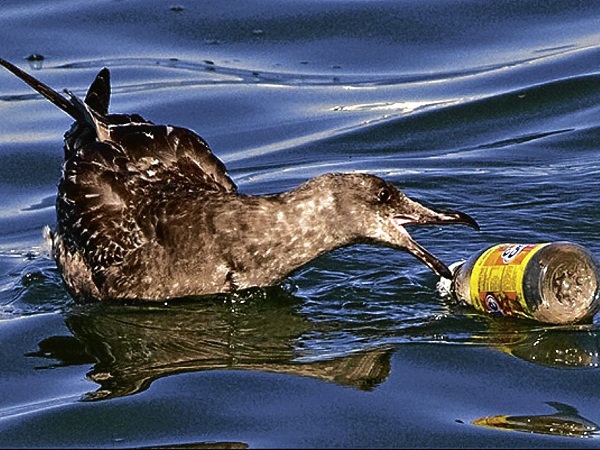Garbage and dinner

ANIMALS looking for food among in the sea mistake plastic and other trash for food. Photo from sfcitizen.com
Many of us are quick to blame many factors that caused the flooding. This includes erratic, severe, extreme weather conditions caused by climate change.
Other factors are rapid urbanization and urban heat island effect that make the metropolis warmer than surrounding places. The high concentration of population in the National Capital Region means more people, more consumption and more solid wastes.
However, not many realize that as consumers, all of us are directly responsible for the problem of flooding.
In Metro Manila, at least 6,000 tons of garbage is generated daily by 11 million people. This means we have an annual per capita waste generation of about 400 pounds in Metro Manila.
The United States has 1,650 lb annual per capita waste generation; Canada has 1,400 lb; Japan has 750 lb.
In the United States, daily solid waste generated can fill up 63,000 garbage trucks lined up from San Francisco to Los Angeles about 400 miles.
Marine trash
Manila’s private garbage collectors are said to have not enough dumping sites that they throw some of the garbage collected into the sea.
There is at present global concern about trash found in the ocean including the ubiquitous coffee cup of polystyrene foam.
Coffee cups of polystyrene foam are broken down in years and found in the stomachs of dead marine animals.
A type of sea gull had an average of 30 pieces of plastic in their stomachs from the litter in the North Sea. Plastic not only kills marine animals, but also damages and degrades their habitat.
Scientists say that the amount of plastic particles in the oceans has grown three times in half a century. Microscopic pieces of plastic can be found everywhere in the seas and oceans, even inside plankton, the keystone of the marine food chain.
Northwest of Hawaii in the not so peaceful Pacific Ocean, bigger than Texas is the Great Pacific Garbage Patch. Weighing more than 3 million tons around 80 percent of which are tiny pieces of plastic, the garbage patch is a flotsam trapped by air and ocean currents. A similar occurrence is taking place in the North Atlantic Ocean.
Endangered coral reefs
Coral reefs are called the rainforests of the sea because they provide abundant homes and food to marine life. They need temperature of at least 18 degrees Celsius and are therefore abundant in the tropics. They are vulnerable to pollutants, cyanide and dynamite, and sudden rise of water temperature like El Niño events.
Illegal activities including dumping of garbage into the sea damage algae that grow abundantly in coral reefs. Fish looking for food among disappearing coral reefs mistake plastic and other trash for food.
One can imagine the amount of plastic consumed by fish that we serve on the dinner table.
Policy options
Some countries study product fees to be imposed like a material levy related to the potential waste disposal and pollution impact of a product.
A consumer may also be made to pay a deposit at the time of purchase as part of the product price, and given a refund if the waste product such as empty bottles and aluminum cans are returned to the seller or authorized recycling centers.
Singapore and Australia have a Polluter Pays Principle for damage done to the environment in production or packaging of products. Local government units may impose heavy fines for the violation of legislated systems and methods of collection, conveyance and disposal of solid wastes.
For comments or inquiries, e-mail amadodejesus@gmail.com.
